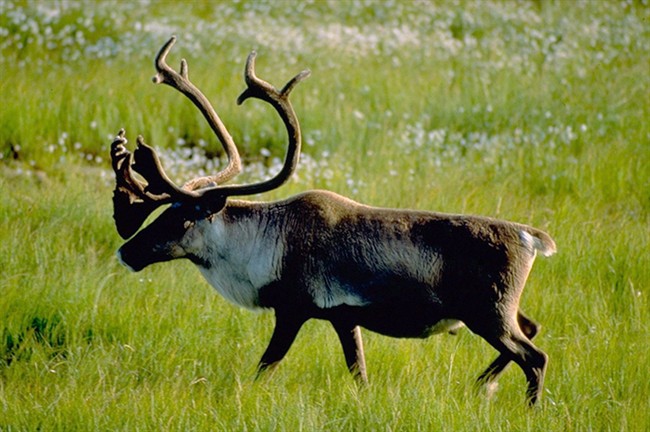A caribou researcher says Alberta’s decision to suspend portions of its draft plan to help the threatened animals recover is the first major test of the federal Species at Risk Act.

The province has sent Ottawa a letter that raises concerns about the socio-economic impacts of the recovery plan.
“It’s a bit surprising and dramatic but it’s actually not, really,” said University of Montana biologist Mark Hebblewhite, who is part of a science advisory group on boreal caribou for Environment Canada. “Not just myself, but lots of other people have seen a showdown like this coming.
“Caribou to me are the biggest national test case of the Species at Risk Act in Canada. To date, we have had very inexpensive species-at-risk problems. This is not an inexpensive species-at-risk problem.”
Alberta’s draft plan is designed to help threatened woodland caribou recover in 15 different ranges.
The province plans to spend more than $85 million in the next five years to restore caribou habitat by eliminating seismic lines, building birthing pens and bringing in other measures. It has already invested $9.2 million and the estimated cost over the next 40 years is more than $1 billion.

Get breaking National news
“Caribou recovery cannot occur without an infusion of federal funds to restore habitat necessary to ensure population growth,” said the letter from Environment Minister Shannon Phillips to federal counterpart Catherine McKenna.
Phillips said the province will suspend consideration of conservation lands pending further review and the outcome of a socio-economic impact study.
A scientist in Edmonton said he’s seen similar responses on caribou from past Alberta governments.
“When you see governments start to move to any real efforts to conserve caribou, they run up against this enormous task,” said Stan Boutin, a professor at the University of Alberta.
“The reality of it is that things have been changed so much — particularly in Alberta because of our activities — that fixing the problem now is going to cost an enormous amount of money, probably would mean jobs and all of the bad things government doesn’t want to deal with.”
The federal government should have done an independent socio-economic analysis at the same time as scientific analysis under the Species at Risk Act, Hebblewhite added.
“The bill is here and now they’re all, ‘That’s a lot of money,”’ he said. “It’s a little too late to fix the problem easily.
“Asking the federal government for money … is actually kind of reasonable. It’s just going to ripple across the country.”
Other provinces have started to raise similar concerns about how to pay for saving caribou.
Earlier this month, the Quebec government said it would be too expensive to try to save a small herd whose habitat has been decimated by human activity. The province estimated it would cost $76 million to help the 18 remaining animals in the Val-d’Or herd, with a slim chance of success.
An emailed statement from McKenna said the federal government is committed to protecting caribou.
“We’re working with provinces, including Quebec and Alberta, as well as stakeholders and Indigenous communities, to address challenges facing this iconic species,” said the email.
It added that Ottawa earmarked $1.3 billion over five years in its recent budget to expand protected areas and help endangered and threatened species.
Ottawa is set to publish a report in April on steps being taken by provinces to protect critical habitat.
If it’s determined that boreal caribou or critical habitat are not being protected, the federal government could impose a cabinet order that would allow the act to be applied on provincial lands.
It would prohibit any development, such as oil drilling and forestry, that could harm the animals.
“Any attempt by the federal government to do so will be subject to a decade of litigation,” said Shaun Fluker, an environmental law professor at the University of Calgary. “By then the caribou could very well be extirpated from Alberta.”






Comments
Want to discuss? Please read our Commenting Policy first.